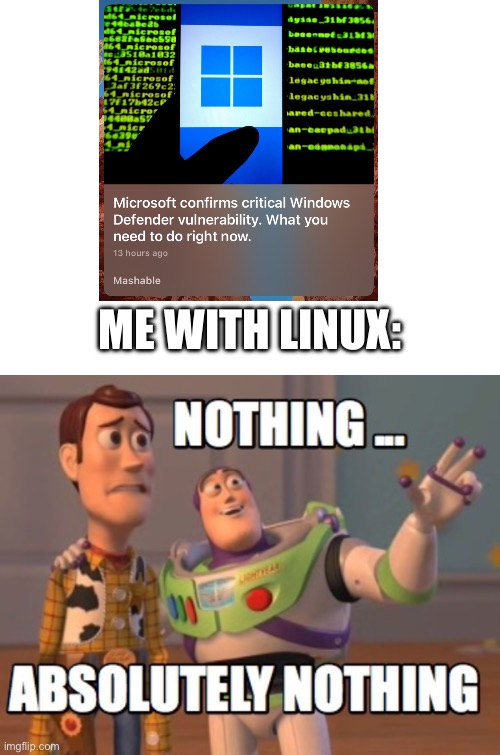this post was submitted on 17 Dec 2024
379 points (85.6% liked)
linuxmemes
21625 readers
105 users here now
Hint: :q!
Sister communities:
Community rules (click to expand)
1. Follow the site-wide rules
- Instance-wide TOS: https://legal.lemmy.world/tos/
- Lemmy code of conduct: https://join-lemmy.org/docs/code_of_conduct.html
2. Be civil
- Understand the difference between a joke and an insult.
- Do not harrass or attack members of the community for any reason.
- Leave remarks of "peasantry" to the PCMR community. If you dislike an OS/service/application, attack the thing you dislike, not the individuals who use it. Some people may not have a choice.
- Bigotry will not be tolerated.
- These rules are somewhat loosened when the subject is a public figure. Still, do not attack their person or incite harrassment.
3. Post Linux-related content
- Including Unix and BSD.
- Non-Linux content is acceptable as long as it makes a reference to Linux. For example, the poorly made mockery of
sudoin Windows. - No porn. Even if you watch it on a Linux machine.
4. No recent reposts
- Everybody uses Arch btw, can't quit Vim, and wants to interject for a moment. You can stop now.
Please report posts and comments that break these rules!
Important: never execute code or follow advice that you don't understand or can't verify, especially here. The word of the day is credibility. This is a meme community -- even the most helpful comments might just be shitposts that can damage your system. Be aware, be smart, don't fork-bomb your computer.
founded 2 years ago
MODERATORS
you are viewing a single comment's thread
view the rest of the comments
view the rest of the comments

If you actually dig deeper into the Linux security topic, you'd find out that Linux is actually not very secure. GrapheneOS developers made quite a lot of posts on what Linux distros (and the kernel) are missing in terms of security. A lot of "Linux security and the lack of viruses" rides on the waves of "there is hardly any point of creating malware for a system with such a small user base, plus you have to consider the fact that people knowledgeable enough just to install a Linux distro would be a bit more careful about their computers than the average Joe".
Actually the whole world runs on linux, Windows is mostly the low level consumer end.
Which makes your argument true for a certain segment of malware (the cheap low tech stuff more akin to scams etc targeting people en mass but expected to have a low return), but not actually for the parts where the money is that justify elaborate malware and hacks.
The internet runs on linux.
(Webservers, some network equipment, monitoring servers, NAS, DNS, ... lots of services can be setup and ran for free on linux. ((Companies like free)))
A lot of companies stuff also runs on linux when it's not free, just so they can avoid having to manage the hardware side... see: Google Cloud, AWS, Azure etc.
The amount of companies having their whole infrastructure run by one of the big cloud services on linux servers nowadays is far too high to make a serious argument of "linux is only secure because it's irrelevant and no one cares to break it".
Most companies like free. Larger companies like support contracts and shifting liability.